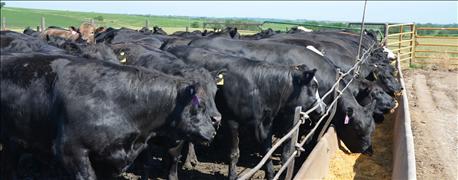
The Trans Pacific Partnership has made a lot of headlines in the last few years. The multilateral trade agreement has drawn both support and criticism from different stakeholders, including those in agriculture. According to a recent economic analysis conducted by the Nebraska Farm Bureau, virtually every county in Nebraska would benefit from TPP.
After years of negotiations, twelve countries, including a number of Pacific Rim countries and the U.S., came to an agreement on TPP in October. Of course, it has to be approved by Congress first.

BENEFITS TO BEEF: Out of all Nebraska commodities, beef stands to benefit the most from TPP. Nearly 40% of Nebraska's projected increases in sales in ag products under TPP would come from the sale of beef into TPP countries, according to an economic analysis by the Nebraska Farm Bureau.
"It's estimated in the figures we have that TPP will increase cash receipts in Nebraska by $378.5 million annually once the trade agreement is fully implemented," Nebraska Farm Bureau president Steve Nelson said during a conference call yesterday following a press conference calling on Congress to enact the agreement. "Without the U.S.'s participation in the agreement, that $378.5 million-benefit to Nebraska will not happen."
Supporters say the agreement would help reduce trade barriers and improve market access to countries involved in the agreement. According to the analysis, Cuming County would benefit the most among Nebraska counties, with a $16,999,543 increase in ag sales – $13,264,942 of it due to an increase in cattle sales – followed by Custer, Platte, Dawson, and Lincoln counties.
Benefits to Nebraska ag
Nearly 40% of Nebraska's projected increases in sales in ag products under TPP would come from the sale of beef into TPP countries, according to the analysis. And exports account for around $150 to $200 per head in Nebraska beef production, said Troy Stowater, president elect of the Nebraska Cattlemen.
One of the biggest benefits would come in reducing trade barriers with Japan. The current tariff on beef products going to Japan is around 38%. However, pending TPP passage, that tariff would be reduced to 9%. "Unless TPP is enacted, Nebraska beef will see tremendous losses to beef sales in Japan," Stowater says. "It is essential for Nebraska producers to have this added value. We cannot sit by and let our state's cattle industry be one of the biggest losers in exports."
~~~PAGE_BREAK_HERE~~~
The analysis projects Nebraska pork sales statewide would expand by over $39 million annually with the passage of TPP. And exports have already made a positive impact on Nebraska's pork sector, said Al Juhnke, Nebraska Pork Producers Association executive director. "If you go back to 1989, the exports of pork based on our total production a year were less than 2% of what we produced. Today it's 25% and growing," Juhnke said. "We see trade agreements adding anywhere from $40, $50, up to $60 a head in pork production."
Cash receipts from corn sales represent the second largest growth area under TPP provisions. "TPP will increase cash receipts for corn $76 million across state," said Kelly Brunkhorst, executive director of the Nebraska Corn Board. "Our state is a leader in cattle and swine, and expanding opportunities for value added industries will benefit all farmers and ranchers in Nebraska. Market opportunities provided through international trade is a boost agriculture needs."
Jim Miller, Nebraska Soybean Association director, noted TPP would increase the value of soybeans in Nebraska by 12 cents a bushel. "We're not going to gain a whole lot with TPP because we already have very low tariffs on soybeans and soybean meal. Our biggest gain will be in soybean oil," Miller said. "Where we see our biggest gain is with our livestock industry at home we'll increase exports of our livestock industry. We hope to feed more soy here in the U.S. which will create more jobs."
Opening trade doors
Although China is not among the twelve nations involved in the TPP, Gov. Pete Ricketts noted the trade agreement, if enacted, may help open doors between the U.S. and China in the future. "I think this will put more pressure on [China] to open up markets for our product. If they see a neighbor like Japan taking more of our beef, China is going to want more of the same thing," Ricketts said. "I think this does put competitive pressure on them to open up markets for our beef. Their consumers are going to demand it."
Ricketts also pointed out ag exports account for around $7.2 billion annually in Nebraska, and TPP provides a way to expand those market opportunities and add value to Nebraska commodities. "Ninety-six percent of the world's consumers lie outside our border," Ricketts said. "This is a great way to expand our opportunities to sell more products overseas where rising standards of living are increasing demand for what we grow in Nebraska."
About the Author(s)
You May Also Like






